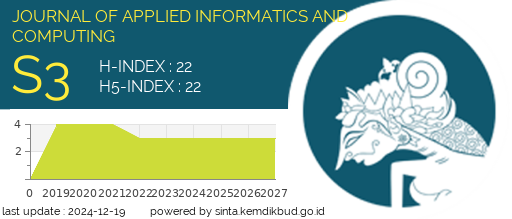Penerapan Metode Forward Chaining dalam Perancangan Sistem Pakar Tes Emotional Quotient (EQ) Berbasis Web
DOI:
https://doi.org/10.30871/jaic.v3i2.1640Keywords:
Expert System, Emotional Quotient, Forward Chaining, UMLAbstract
Humans as social beings who must interact with various other individual character types must have emotional intelligence. Emotional intelligence is not the same person, intelligence is influenced by the family environment, age, and physical. High or low emotional intelligence influences how to interact and work. Individuals who have low emotional intelligence tend to have individualistic traits and cannot work together in teams, for that every company or agency needs to conduct tests on prospective employees. IQ and EQ tests conducted by companies to prospective employees so far have been done manually, so that problems often occur such as the test taker takes a long time to correct answer sheets, errors in calculating scores and reports of long test results when the test participants are in the amount big. Given the company's mistakes are often too late and wrong in making decisions to accept the right employees, for that we need to make an expert system that can help companies in conducting EQ tests for the selection process of prospective employees in accordance with the desired criteria. Expert system that is designed using the method of forward chaining is a method of searching or tracking information starting from existing information and combined with the rules to get a conclusion. Expert System Design uses an object oriented approach and PHP programming language so that it can be used to help companies, especially in the Human Resource Department (HRD) in the selection of prospective employees.
Downloads
References
M. Gitosaroso, "Kecerdasan Emosi ( Emotional Intelligence )," J. Khatulistiwa, vol. 2, no. 2, pp. 182"“200, 2012.
T. Fitriastuti, "Pengaruh Kecerdasan Emosional, Komitmen Organisasional dan Oranizational Citizenship Behavior Terhadap Kinerja Karayawan," J. Din. Manaj., vol. 5, no. 2, pp. 171"“182, 2014.
M. K. Mufida, M. Santiputri, N. Z. Janah, D. E. Kurniawan, and M. Idris, 'Lecturer Workload Optimization Applying Interactive Visualization', in IOP Conference Series: Materials Science and Engineering, 2018, vol. 407, no. 1, p. 12113.
R. Saptoto, "Hubungan Kecerdasan Emosi dengan Kemampuan Coping Adaptif," J. Psikol., vol. 37, no. 1, pp. 13"“22, 2015.
A. Nggermanto, Kecerdasan Quantum. Bandung: Nusa Cendikia, 2015.
A. D. Putri and D. Suhendra, "Sistem Pakar Untuk Mendeteksi Kerusakan Air Conditioner Menggunakan Metode Forward Chaining Berbasis Web," J. Inovtek Polbeg, vol. 1, no. 2, pp. 146"“160, 2016.
H. Hayadi, Sistem Pakar. Deeppublish, 2016.
N. Z. Janah, Y. Rokhayati, D. E. Kurniawan, and M. F. Muvariz, 'Electronic School Books Dissemination Application for Batam Hinterland Schools', Adv. Sci. Lett., vol. 24, no. 12, pp. 9739"“9744, 2018.
T. A. Kurniawan, "Pemodelan Use Case (UML): Evaluasi Terhadap beberapa Kesalahan dalam Praktik," J. Teknol. Inf. dan Ilmu Komput., vol. 5, no. 1, p. 77, 2018.
D. Dhining, Y. Rokhayati, D. E. Kurniawan, and others, 'Penerapan Replikasi Data pada Aplikasi Ticketing Menggunakan Slony PostgreSQL', J. Appl. Informatics Comput., vol. 1, no. 2, pp. 9"“18, 2017
A. B. Prabowo, "Sistem Pakar Untuk Mendiagnosa Penyakit Infeksi Saluran Pernafasan Akut (ISPA) Berbasis Web," J. Sarj. Tek. Inform., vol. 2, no. 1, pp. 1"“5, 2014.
G. Urva, H. F. Siregar, J. Prof, M. Y. Kisaran, and S. Utara, "Pemodelan UML E- Marketing Minyak Goreng," no. 9, pp. 92"“101, 2015.
Y. Heriyanto, "Perancangan Sistem Informasi Rental Mobil Berbasis Web Pada PT. APM Rent Car," J. Chem. Inf. Model., vol. 53, no. 9, pp. 1689"“1699, 2013.
Downloads
Published
How to Cite
Issue
Section
License
Authors who publish with this journal agree to the following terms:
- Authors retain copyright and grant the journal right of first publication with the work simultaneously licensed under a Creative Commons Attribution License (Attribution-ShareAlike 4.0 International (CC BY-SA 4.0) ) that allows others to share the work with an acknowledgement of the work's authorship and initial publication in this journal.
- Authors are able to enter into separate, additional contractual arrangements for the non-exclusive distribution of the journal's published version of the work (e.g., post it to an institutional repository or publish it in a book), with an acknowledgement of its initial publication in this journal.
- Authors are permitted and encouraged to post their work online (e.g., in institutional repositories or on their website) prior to and during the submission process, as it can lead to productive exchanges, as well as earlier and greater citation of published work (See The Effect of Open Access).











